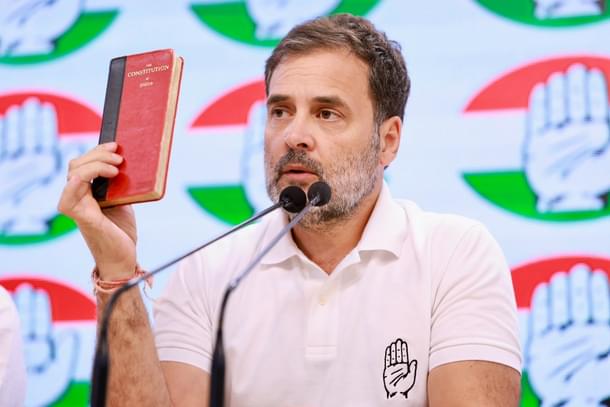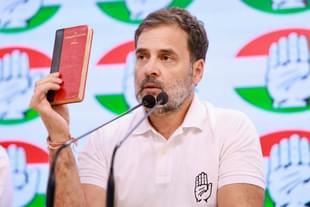Commentary
Is Today's Congress Any Different From The One That Imposed The Emergency?
Aravindan Neelakandan
Jun 25, 2024, 07:00 PM | Updated 07:25 PM IST
Save & read from anywhere!
Bookmark stories for easy access on any device or the Swarajya app.


Forty-nine years after the Emergency, what has changed about the leadership of the Indian National Congress? The answer wouldn't please anyone.
Back then, the reputation and charisma of being Jawaharlal Nehru’s daughter provided Indira Gandhi with an advantage over the ageing, battle-hardened veterans of the Congress party.
Many of the older leaders welcomed Indira, while a few did so grumblingly. Many also thought Indira would lack the skills of political strategy. One leader infamously referred to her as a ‘doll’.
But Indira proved all such thinking wrong. She showed that she was a more ruthless and ambitious politician than anyone thought.
Indira spoke of Gandhian values and practised Machiavellian politics. For instance, the way she used an agitation for cow protection to get rid of her party rivals, mostly seniors, was, to say the least, diabolical.
She also steered Indian foreign policy towards the Soviet Union, almost turning India into a Soviet satellite. She was never really democratic at heart, and she implanted dynastic politics in a democratic nation.
After the imposition of the Emergency, one of Indira's main targets was the Rashtriya Swayamsevak Sangh (RSS). To show a semblance of balance, she also banned the Islamist fundamentalist movement Jamaat-e-Islami Hind.
A transnational movement, Jamaat-e-Islami Hind's East Pakistan branch played an active role in the 1971 genocide. Ideologically, it differed little from its Pakistani counterpart and tried its best to keep India from intervening.
In Kashmir, the Emergency led to Jamaat-e-Islami Hind obtaining a larger government-aided outreach as the state recruited its school teachers into government schools, which offered them a large audience for their radicalisation project.
This was the start, along with the rigged election by Indira, that led to the rise of Islamist terrorism in Kashmir, eventually leading to the ethnic cleansing of Kashmiri Pandits.
In the 1980s, Indira's Congress actively engaged in the covert encouragement of Sikh radicalised separatism. It created immense human suffering for all in Punjab. It led to terrorists killing innocent Hindus, the Indian army entering the Golden Temple, and finally the assassination of Indira in 1984.
After the death of Sanjay Gandhi, Indira Gandhi's elders son, Rajiv Gandhi, entered politics and became the heir apparent. It was now only after this that Rajiv's wife, Sonia Gandhi, applied for an Indian citizenship on 30 April 1983. A full 15 years after her wedding to Rajiv.
According to Khushwant Singh, a journalist close to the dynasty, Indira initially chose Maneka Gandhi as her secretary. Sonia did not take this lightly. She threatened Indira that if she (Indira) did not withdraw the offer to Maneka, Sonia would take the children and return to Italy.
Soon, Maneka was evicted unceremoniously from the Prime Minister's residence. The scene turned so ugly that Indira "began to cry hysterically and had to be escorted out of the room by Dhirendra Brahmachari," who himself would die in an air crash later.
During the reign of Rajiv Gandhi, the Italian influence on the prime minister went beyond the Italian shoes that Rajiv wore when he was assassinated. Apart from his cruel comments on the violence against Sikhs, Rajiv also removed Jagmohan as governor of Kashmir, facilitating a terrorist takeover.
One does not know what the role of the notorious ‘kitchen cabinet’ was in all these developments. Former cabinet secretary B G Deshmukh revealed that, when he learned that some of the prime minister's security personnel were required to go to Italy for special training, he asked Rajiv about it.
Rajiv asked Deshmukh to speak to Captain Satish Sharma, who in turn revealed that the Research and Analysis Wing (RAW) head should speak to a certain Italian person who was laughingly referred to by Sharma as ‘Rajiv Gandhi’s brother-in-law’. Sonia was not known to have any brothers.
Later, an Italian did come to India to train security personnel. His behaviour was so rude and unprofessional that he had to be sent back.
In other words, the Italian connection has always been present in the Congress since Sanjay Gandhi's passing.
When comparing the behaviour of the Congress party under Sonia, Rahul, since Sonia's rise to power with Indira's Congress, one can see a concerning transformation:
1. Rejection of India as a nation
Rahul Gandhi became the first person from the dynasty to articulate the view that India was a 'union of states' and not exactly a nation.
His grandmother Indira always promoted the slogan ‘Kashmir to Kanyakumari, India is one nation’. Nehru also acknowledged the undeniable unity of the India.
But Rahul repeatedly prefers calling India a 'union of states'.
2. Slighting national heroes and symbols
Rahul's insulting comments about Veer Savarkar are not just attacks on Hindutva and its icons. They betray something deeper.
In 2006, Sonia Gandhi skipped the centenary celebrations of Vande Mataram. It was only after much outcry and pressure from the then-opposition Bharatiya Janata Party (BJP) that she sang it at a much less significant event on party foundation day in December that year.
Even that centenary celebration was more about going through the motions than celebrating a historic song.
What should be gratifying for the Congress of today is that even the Shiv Sena (Uddhav Balasaheb Thackeray), apart from some protestations by second-rung leaders, largely allows the insult of Savarkar to pass.
3. Apparent Aversion To Hindu Culture
There is enough documentary evidence to show that UPA regime was never comfortable with celebrating, or even accepting, the Hindu character of Indian society.
Retired Indian Administrative Service (IAS) officer I Y R Krishna Rao revealed, for instance, that when he was executive officer of Tirumala Tirupati Devasthanams (TTD), a meeting of all Hindu dharmacharya sadas was stopped in the last minute because it might "annoy madam."
Another indication for the same is Rahul Gandhi's body language in Hindu temples as compared to spaces of other religions.
But these are insignificant matters compared to, for example, the Communal Violence Bill, which could virtually penalise any Hindu in response to a complaint from a non-Hindu.
If the bill had become a reality, any communal violence or even a complaint would allow the establishment to selectively threaten, intimidate, and abuse Hindus.
4. Looking Away
In 2009, the entire Tamil population in Sri Lanka was subjected to gross and extreme human rights violations. Mass murder was justified as ‘collateral damage’ for eliminating the rebel group Liberation Tigers of Tamil Eelam (LTTE).
The Indian government, then with Dr Manmohan Singh as prime minister but Sonia Gandhi as the real centre of power, remained an ineffective spectator.
At the same time, the Congress leadership maintained silence about the release of those convicted for participation in the plot to assassinate Rajiv Gandhi, which killed, apart from the prime minister, many innocent Indians.
The UPA and the Congress under Rahul have also given importance to someone like Kancha Illaiah, whose views on Brahmins mirror the anti-Semitic views held by Nazis in Germany of the mid-twentieth century.
But there is a pattern to all this.
It was the notorious Liaquat-Nehru pact that made Bengali Hindus hostages in East Pakistan and paved the way for the 1971 genocide of Hindus.
It was Indira Gandhi's tacit support to the extremist elements that led to the problem in Punjab.
Rajiv Gandhi government made error after error in Kashmir and the Hindus of the valley paid for it.
The UPA regime under Sonia Gandhi played witness to the atrocities on Sri Lankan Tamils.
What fuels a dynasty with such a history?
What is their appeal despite being linked to such tragedies?
Today, the Congress is not merely a political opposition. It has placed itself as an antithesis to everything that 'India that is Bharat' represents.
So, as we mark 49 years since the imposition of Emergency, let us remind ourselves that the party which imposed it is still capable of delivering similar or harsher blows to India's democracy. Eternal vigil is the key.





